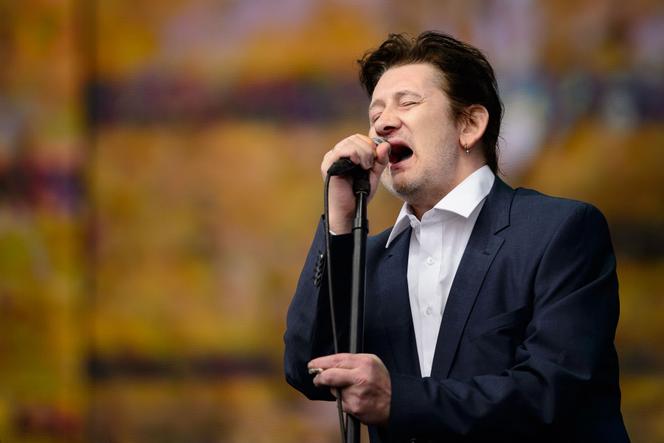


Shane MacGowan, the singer-songwriter and frontman of "Celtic Punk" band The Pogues, best known for the Christmas ballad "Fairytale of New York," died on Thursday, November 30, his family said. He was 65.
"It is with the deepest sorrow and heaviest of hearts that we announce the passing of our most beautiful, darling and dearly beloved Shane MacGowan," his wife Victoria Clarke, his sister Siobhan and father Maurice said in a statement. The singer died peacefully with his family by his side, the statement added.
The musician had been hospitalized in Dublin for several months after being diagnosed with viral encephalitis in late 2022. He was discharged last week, ahead of his upcoming birthday on Christmas Day.
The Pogues fused Irish traditional music and rock’n’roll into a unique, intoxicating blend, though MacGowan became as famous for his sozzled, slurred performances as for his powerful songwriting.
His songs blended the scabrous and the sentimental, ranging from carousing anthems to snapshots of life in the gutter to unexpectedly tender love songs. The Pogues’ most famous song, "Fairytale of New York" is a bittersweet Christmas classic that opens with the decidedly unfestive words: "It was Christmas Eve, babe, in the drunk tank."
Born on Christmas Day 1957 in England to Irish parents, MacGowan spent his early years in rural Ireland before the family moved back to London. Ireland remained the lifelong center of his imagination and his yearning. He grew up steeped in Irish music absorbed from family and neighbors, along with the sounds of rock, Motown, reggae and jazz. He attended the elite Westminster School in London, from which he was expelled, and spent time in a psychiatric hospital after a breakdown in his teens.
MacGowan embraced the punk scene that exploded in Britain in the mid-1970s. He joined a band called the Nipple Erectors, performing under the name Shane O’Hooligan, before forming The Pogues alongside musicians including Jem Finer and Spider Stacey. The Pogues — shortened from the original name Pogue Mahone, a rude Irish phrase — fused punk’s furious energy with traditional Irish melodies and instruments including banjo, tin whistle and accordion.
"It never occurred to me that you could play Irish music to a rock audience," MacGowan recalled in "A Drink with Shane MacGowan," a 2001 memoir co-authored with Clarke. "Then it finally clicked. Start a London Irish band playing Irish music with a rock and roll beat. The original idea was just to rock up old ones but then I started writing." "I wanted to make pure music that could be from any time, to make time irrelevant, to make generations and decades irrelevant," he recalled in his memoir.
The Pogues were briefly on top of the world, with sold-out tours and appearances on U.S. television, but the band’s output and appearances grew more erratic, due in part to MacGowan’s struggles with alcohol and drugs. He was fired by the other band members in 1991. He performed with a new band, Shane MacGowan and the Popes, before reuniting with The Pogues in 2001 for a series of concerts and tours.
MacGowan received a lifetime achievement award from Irish President Michael D. Higgins on his 60th birthday. The occasion was marked with a celebratory concert at the National Concert Hall in Dublin with performers including Bono, Nick Cave, Sinead O’Connor and Johnny Depp.
Clarke wrote on Instagram that "there’s no way to describe the loss that I am feeling and the longing for just one more of his smiles that lit up my world." "I am blessed beyond words to have met him and to have loved him and to have been so endlessly and unconditionally loved by him and to have had so many years of life and love and joy and fun and laughter and so many adventures," she wrote.
